Online Casino & Sports Betting Regulations in Spain | 2025
- Author:Monika Gola
- Read Time:15m
- Published:
- Last Update:March 2nd, 2026
Spain has witnessed remarkable growth in the iGaming industry globally. This blog discusses online casino and sports betting regulations Spain. Stride along till the end.
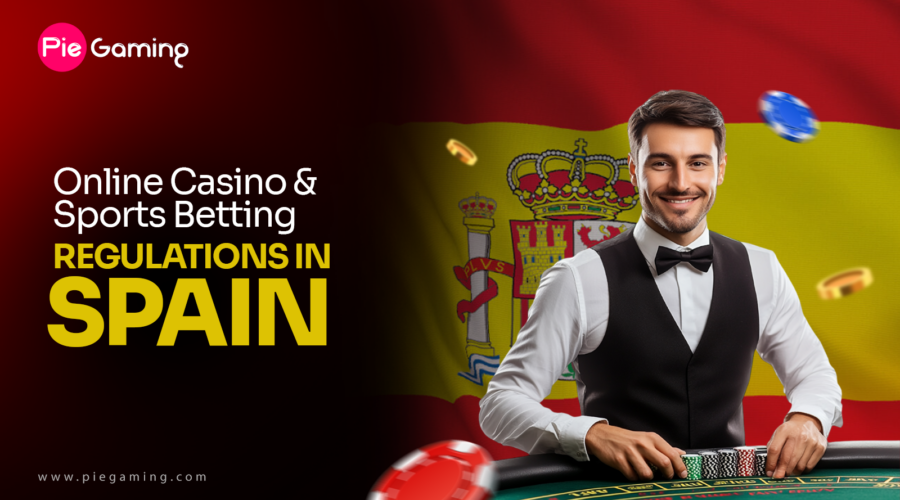
Did the growing iGaming market in Spain catch your attention?
If yes, we bet you’re planning to open an iGaming platform in Spain.
Indeed, the market offers significant opportunities for operators to build a highly engaged player base and yield maximum ROI.
But wait!
Like any other market, the online casino industry also requires licensing and compliance with regulations to run a successful business without any hiccups.
This is what we’re here to uncover. We’ll explore everything you need to know about Spain iGaming regulations to enter this thriving market.
History Of Casino & Sports Betting Games In Spain
Let’s break down the history first to understand sports betting regulations Spain better.
First thing, casino or sports betting has never been legal in Spain. It was back in the 1880s when casino games took organized form with the development of the Spanish National Lottery in 1763 under King Carlos III.
But in the 20th century, casino gaming was often regarded with suspicion, which led to periodic restrictions.
The first attempt to clamp down on illegal casinos was through the Ley de Represión del Juego of 1922. However, it was difficult to prevent people from playing popular casino games, which led to the first Gambling Act of 1997.
The breakthrough happened when the 21st century saw the emergence of the digital age, and with it, the arrival of iGaming. This is when Spain legalized iGaming with the Spanish Gambling Act of 2011.
Thanks to this act, started regulating the booming online casino industry and established the Dirección General de Ordenación del Juego (DGOJ) to direct licenses and maintain the industry’s integrity.
The Current Situation Of iGaming
Spain’s iGaming market is considered to be the most sophisticated market in Europe. As per stats, about 85% of Spanish adults engage in some form of iGaming every year. This depicts that gaming isn’t just a pastime, but also a part of the cultural heritage of the country.
If we look at the operator’s perspective, the situation of sports betting and online casinos in Spain is characterized by a well-established regulatory framework.
Fundamentally, iGaming in Spain is regulated by Law 13/2011 of the Spanish Gambling Act. The law provides a clear framework for operators to offer online gaming services within the country.
This law applies to a range of activities like poker, bingo, slots, sports betting, and casino games. With such a significant advantage, Spain has become a competitive market for both local and international operators.
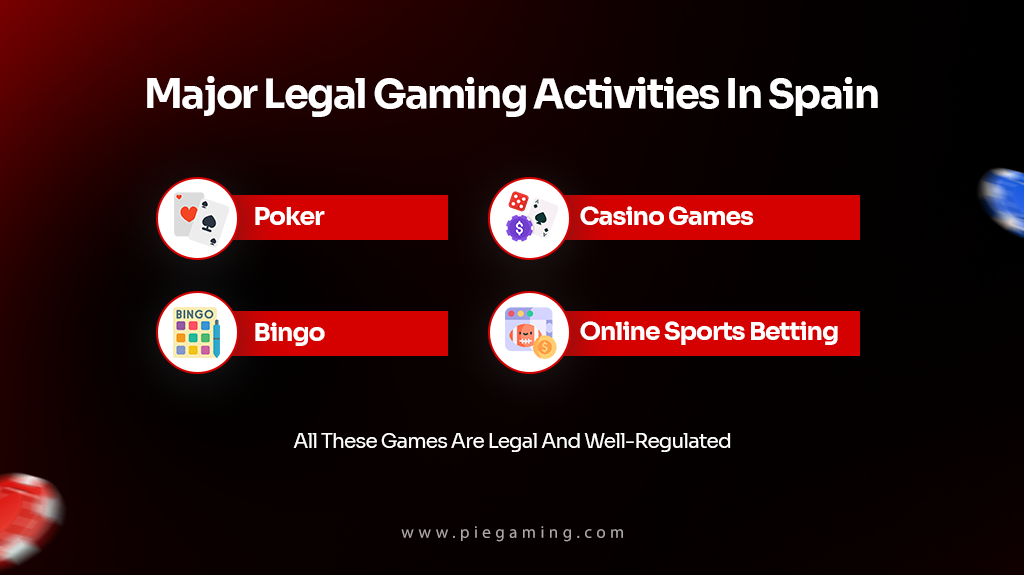
Key Legal iGaming Activities In Spain
Spanish Gambling Laws & Licensing System
As an aspiring operator, if you wish to enter the Spanish market, you must be aware of Spanish gambling laws and the licensing system.
There are two types of licenses: a General (State Level) and a Singular License. Both these licenses need to be obtained by operators.
General License
A general license is an umbrella license with a ten-year term and can be extended for a similar period (Article 10(6), Law 13/2011). Operators can issue this license through a competitive public tender process.
With this license, operators have permission to run a specific type of gaming activity, like betting, contests, and other games like lotteries or casinos. However, the operators can’t launch games immediately.
Singular License
This type of license is considered to be more specific, which operators apply after receiving a general license. This license is for every game or activity operators want to offer, like poker, sports betting, or blackjack (Article 11(5), Law 13/2011).
Think of it this way – first, you need a license to run a casino, then you need a separate license to run specific games in the casino.
A singular license is granted for a maximum period of five years and can be extended for the same period.
Read Blog – How to Get an Online Gaming License
| Note: Operators need to obtain both the license to run a successful online casino legally. |
Top Regulatory Bodies Shaping Spain’s iGaming Industry
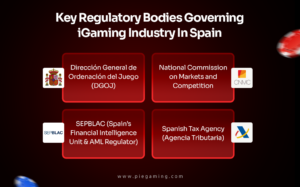
Major Regulatory Bodies In Spain
Just like every country, the iGaming industry in Spain is managed by multiple key authorities that influence the operations. Let’s shed light on the most prominent regulatory bodies in Spain below:
Dirección General de Ordenación del Juego (DGOJ)
DGOJ stands for Directorate General For The Regulation Of Gambling. It is the most influential body managing all iGaming activities in Spain. It operates under the Ministry of Consumer Affairs and implements Spanish gambling laws.
The body issues both general and regular licenses and ensures operators meet demanding technical and operational standards. It also monitors compliance standards like applying anti-money laundering (AML) regulations.
Here, operators need to comply with Law 10/2010, which focuses on preventing money laundering and terrorist financing.
As a practice, operators need to regularly submit reports to DGOJ about player protection, technical audits, and financial activities to ensure transparency.
National Commission on Markets and Competition (NCMC)
This is known to be an independent regulatory agency that ensures fair competition and transparency. This regulatory body prevents anti-competitive behavior to ensure every operator adheres to Spain’s competition laws.
NCMC oversees the advertising and promotional activities of iGaming operators daily. This prevents unfair advertisements and misleading promotions.
Further, in collaboration with DGOJ, NCMC interacts with operators via audits, investigations, and enforcement actions when found suspicious.
SEPBLAC (Spain’s Financial Intelligence Unit & AML Regulator)
As the name suggests, SEPBLAC is responsible for directing anti-money laundering compliance in online casinos Spain. Thus, it ensures operators adhere to Law 10/2010, which prevents money laundering and terrorist financing.
Here’s what this regulatory body oversees:
- Monitor financial transactions
- Conduct customer-due intelligence
- Check suspicious activities
Like NCMC, SEPBLAC also works with DGOJ to audit the AML procedures of licensed operators. This body can impose sanctions and fines for non-compliance with online casino regulations.
Spanish Tax Agency (Agencia Tributaria)
The Spanish Tax Agency plays a pivotal role in overseeing the taxation of iGaming operators. Basically, they ensure both operators and players comply with Spain’s tax laws.
For operators, the agency is responsible for garnering taxes on gross gaming revenue (GGR), which is currently 20%.
Agencia Tributaria also works with DGOJ to ensure that the licensed operators meet their financial obligations. And non-compliance leads to various penalties like fines or potential suspension of iGaming license.
Read Blog – iGaming Software Development Life Cycle
Casino And Sports Betting Market Growth In Spain
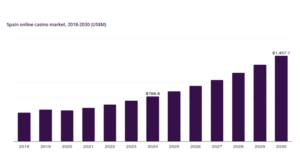
Spain online casino market stats
Every operator who wants to run an iGaming platform would be curious to know about the industry’s growth in Spain. And, here this section covers it only. Let’s discuss.
With over 49 million residents and a stable rise in online casino and sports betting, the iGaming industry in Spain is growing at a fast rate.
According to the Grand View Research Report, the iGaming industry in Spain generated a revenue of USD 891.2 million in 2024 and is projected to reach USD 1,778.1 million by 2030. It is projected to continue growing at a flabbergasting rate.
Further, in terms of segment, sports betting generated a high revenue in 2023.
As per the same report, the Spanish iGaming sector (casino and sports betting market) has grown by an impressive 270% since 2014.
What factors fuel the growth of this sector? Here are the highlights:
- Increasing popularity of mobile gaming
- Reduction in GGR tax from 25% to 20% in 2018
- Stability and security in operating in one of Europe’s regulated markets.
- High demand for sports betting
- Continued high growth in the future
How To Apply For an iGaming License In Spain?
Now that you’re aware of the online casino and sports betting regulations Spain, here are the most awaited guidelines for you to apply for an iGaming license in Spain.
Step 1: Know Licensing Requirements
Prior to the application process, operators must know which licenses are required to offer the particular iGaming activity (they want to offer). As you know, Spain has two primary types of licenses 1) General and 2) Singular.
Step 2: General License Application Process
The application process for a General license can be processed via a public tender process, which is announced by DGOJ periodically.
# The documentation for this application includes:
- Entire business plan (scope of services, target market, and revenue projections)
- Technical projections (security measures, responsible gaming protocols)
- Financial reports (to ensure the financial stability of the company)
# Apply the application via DGOJ’s licensing portal.
Note: A processing fee is required upon submission.
# DGOJ review
# Now, DGOJ evaluates the application process to ensure operators have fully complied with Spanish gambling laws. This includes AML and player protection requirements.
Step 3: Singular License Application Process
Once you get the general license, operators will have to apply for a Singular license. This will define the specific sport or casino games they want to offer, like poker, bingo, slots, etc. The steps include:
# To obtain a singular license, operators will have to provide:
- A detailed description of the particular service
- Proof of financial stability
- Compliance with set standards
# Now operators will have to procure technical certification to ensure their systems (hardware, software, and player management systems) are DGOJ-approved.
Step 4: Set Up A Legal Presence In Spain
Now, this step is for foreign operators who want to run an online casino in Spain. They need to have a legal representative or open a land-based casino in Spain.
This will help ensure operators’ compliance with local laws. Must have considerations:
- Establish a physical office
- Register with the Spanish Tax Authority
Step 5: Meet Financial Requirements
Financial stability is one of the crucial components of any business; therefore, operators have to:
- Ensure bank guarantees cover any potential liability for player funds or regulatory fines.
- Demonstrate and meet capital requirements to support ongoing operations
Step 6: Ongoing Compliance And Audits
Once everything is done from the application to obtaining a license, operators are required to monitor and audit to ensure continued compliance. What they need to do is:
- Conduct regular audits
- AML and Player Protection Compliance
Market Entry Cost For Operators
One of the crucial things that every operator is concerned about the most is COST.
This is where the question arises – how much does it cost to enter the iGaming industry? Here, let’s answer this question…
1. Tax Obligation
First and foremost, Spain imposes a 20% Gross Gaming Revenue (GGR) tax. This tax is reduced to 10% for operators who become tax residents in autonomous cities like Melilla and Ceuta.
Because of these taxes, Spain is considered to be a tax-competitive country, compared to other European markets.
2. Compliance And Certification Fees
These fees also can’t be ignored. Operators need to comply with Spain iGaming regulations. This includes technical certification from authorized bodies, costing up to €15,000. This can vary based on the complexity of the platform.
3. Operational Requirements
Last but not least, operators have to establish a local presence either via a land-based casino or a legal representative. This includes the cost of legal services and other office expenses.
Read Blog – iGaming Markets for Casino Operators
Way Forward…
In the end, we can say that the gambling regulation in Spain is designed for growth, presenting immense opportunities for operators to excel in this industry.
Since Spain’s market is characterised by a comprehensive legal framework, operators have to comply with all sports betting and online casino regulations Spain.
At PieGaming, we ensure every operator meets all legal standards to easily enter the market without any complications.
Our advanced white label iGaming software solution will ensure swift entry to Spain’s iGaming market.
Reach out today to learn how we can help you stay competitive in the thriving world of Casinos.
FAQs
-
What are the licensing requirements for operators?
All operators must obtain a license from Dirección General de Ordenación del Juego (DGOJ). This includes a general license for iGaming activities and a specific license for each type of game offered.
-
How does Spain protect minors from gambling?
Spain imposes strict age verification measures. Therefore, operators are required to verify users’ identities before giving access to iGaming services.
-
Are there any recent changes to gambling regulations?
Yes, the recent update includes strict advertisement, increased player protection measures, and strict enforcement of responsible gaming policies. This will help ensure a safe and transparent gaming environment.
-
What is the legal age for participating in online gambling?
The legal age for iGaming in Spain is 18 years old. As an operator, you must implement a powerful age verification system to prevent minors from accessing the iGaming website.
-
Are there any fees associated with obtaining a gambling license?
Yes, operators have to pay application fees, license issuance fees, and ongoing regulatory fees to maintain compliance. However, the fee can vary depending on the game you offer and the jurisdiction you choose to operate your business.

Monika Gola is a seasoned writer at PieGaming specializing in the iGaming industry. With years of experience, she delivers insightful content on trends, innovations, and strategies in the online casino domain. Monika's work is known for her clarity and depth, making complex topics accessible and easy to understand to a wide audience. Explore the world of iGaming through her engaging and informative content.
-
 Monika Gola February 26, 2026
Monika Gola February 26, 2026This blog walks you through the top eSports games, most played and watched by the audience. Stay tuned to find out about the best eSports betting games available worldwide.
-
 Palak Madan February 13, 2026
Palak Madan February 13, 2026Learn what virtual sports betting is, how it works, and why it’s growing fast in iGaming. A clear, practical guide for operators and betting platforms.
-
 Palak Madan September 29, 2025
Palak Madan September 29, 2025Discover the latest online casino and sports betting regulations in Algeria. Learn how the laws impact operators, players, and the future of iGaming in the region.
-
 Monika Gola August 5, 2025
Monika Gola August 5, 2025Armenia offers golden opportunities to iGaming operators. Here, get a quick insight into online casino and sports betting regulations in Armenia.
-
 Palak Madan June 20, 2025
Palak Madan June 20, 2025Canada’s 2025 iGaming laws vary by province. This guide breaks down what’s legal, what’s changing, and where online casinos and sports betting stand today.
-
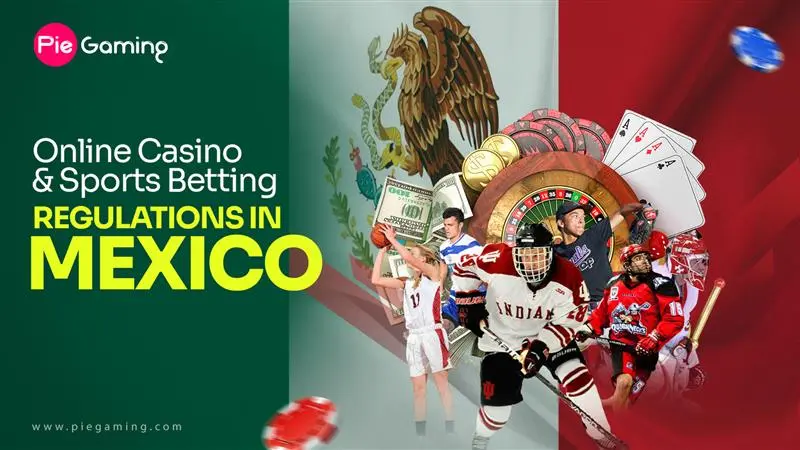 Monika Gola June 19, 2025
Monika Gola June 19, 2025Mexico is actively developing as a promising iGaming market. It’s a golden opportunity for operators to learn about online casino and sports betting regulations in Mexico to start an iGaming platform.
-
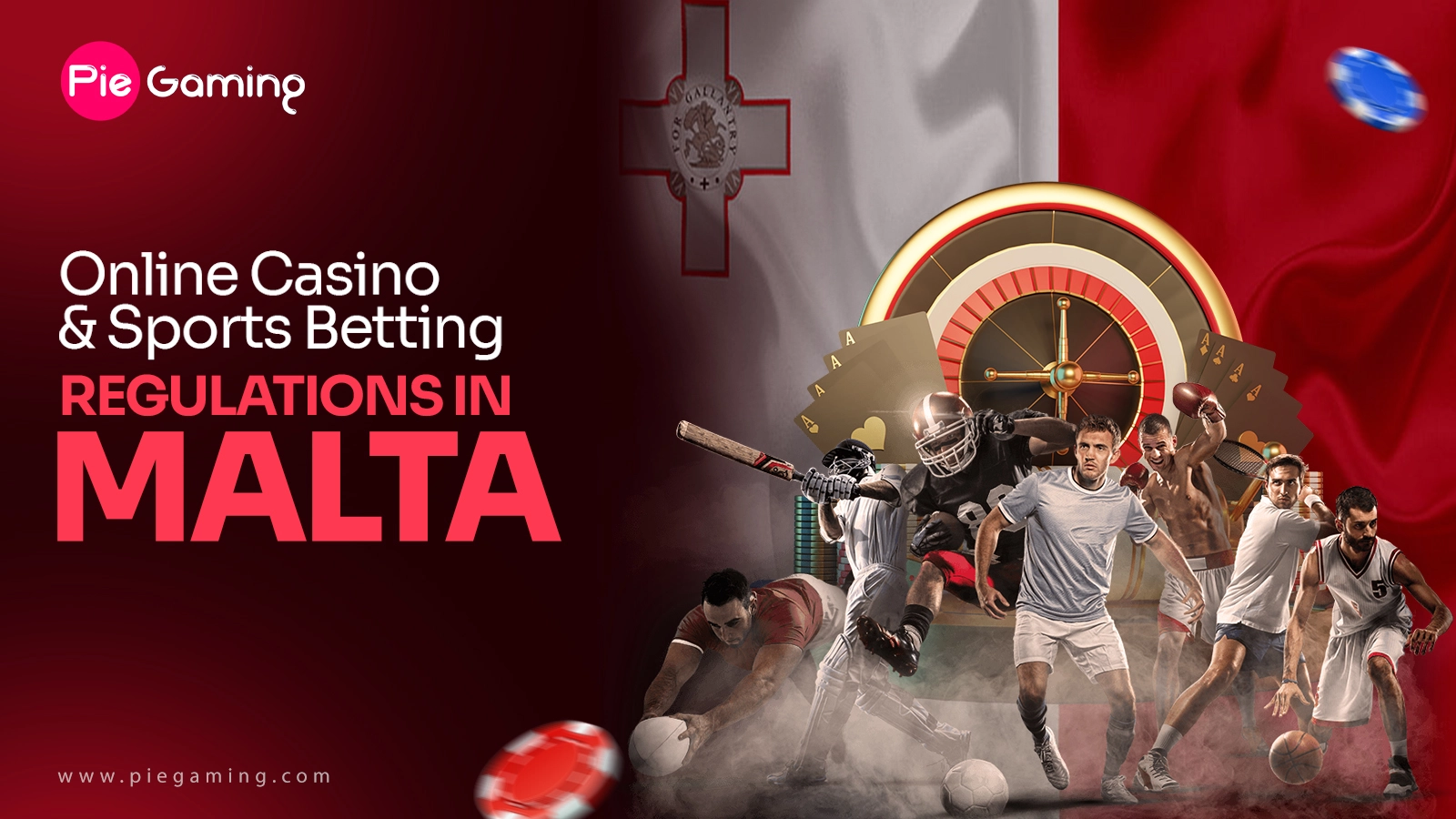 Monika Gola June 5, 2025
Monika Gola June 5, 2025Planning to launch your iGaming business in Malta? This free guide covers sports betting and online casino regulations in Malta to help you run a safe and legal iGaming business.
-
 Palak Madan April 29, 2025
Palak Madan April 29, 2025This guide lists the top 10 sports betting odds providers in 2026, helping operators choose fast, accurate, and reliable data sources for their platforms.
-
 Palak Madan April 23, 2025
Palak Madan April 23, 2025The UK’s online sports betting and casino regulations in 2025 focus on permits, following rules, and keeping players safe. Companies must follow new…
-
 Monika Gola April 10, 2025
Monika Gola April 10, 2025Sports betting has been in the roots of South Africa. It’s an opportunity for operators to run an iGaming business and rake in…
-
 Palak Madan February 26, 2025
Palak Madan February 26, 2025Sports betting software development involves creating custom platforms. These platforms help manage bets, process payments securely, and provide live betting options. They also keep users engaged, which helps businesses grow.
-
 Palak Madan November 20, 2024
Palak Madan November 20, 2024Starting a sports betting business in the UK involves ensuring compliance, obtaining licenses, selecting software, setting up payment systems, and much more. Let’s…
-
 Monika Gola August 9, 2024
Monika Gola August 9, 2024A trusted sportsbook platform handles odds, risks, and real-time betting. This guide highlights the top sportsbook software providers to trust. Launching or scaling…
-
 Nikita Ajmani July 11, 2024
Nikita Ajmani July 11, 2024Sports Betting in the iGaming Industry: A market finally getting its dues! Existing for over a century in various parts of the world,…
-
 Simranjeet Kaur July 5, 2024
Simranjeet Kaur July 5, 2024In the high-stakes sports betting world, fortunes can be made or lost as a result of a single match outcome. But what if…
-
 Palak Madan May 28, 2024
Palak Madan May 28, 2024This blog explores the world of sports betting, covering new sports betting trends like mobile apps and AI, key challenges, and future growth…
-
 Simranjeet Kaur May 14, 2024
Simranjeet Kaur May 14, 2024Let’s understand sports betting and odds in sports betting, how they are calculated, and how as a beginner, you can read them.
-
 Palak Madan April 4, 2024
Palak Madan April 4, 2024Explore the future of online sports betting in 2025 and learn how innovation, data, and evolving regulations are shaping growth and global market opportunities.
-
 Palak Madan March 6, 2024
Palak Madan March 6, 2024This checklist covers everything your online sportsbook needs to succeed. From licensing and payment methods to odds providers and security. Use it to avoid costly oversights and stay ahead of your competition.
-
 Palak Madan February 8, 2024
Palak Madan February 8, 2024White label betting exchange solutions let you launch your own peer-to-peer betting platform easily and quickly. This guide covers how they work, key features, and benefits for operators.
-
 Palak Madan February 1, 2024
Palak Madan February 1, 2024See how white label sportsbook solutions make online sports betting better. Explore custom features, quick setup, and benefits for operators in 2025.
-
 Monika Gola January 31, 2024
Monika Gola January 31, 2024Discover the top 6 tips for selecting reliable turnkey betting platform providers to enhance the betting experience for your customers. Click to read now.
-
 Palak Madan January 16, 2024
Palak Madan January 16, 2024Here’s the list of the leading 5 whitelabel sports betting exchange providers worth exploring. Note their exceptional services & offerings setting them apart.
-
 Palak Madan December 30, 2023
Palak Madan December 30, 2023Want to launch your own sportsbook? Learn how to create your own sports betting platform from scratch — from licensing to compliance. Start smart in 2026.
-
 Monika Gola December 6, 2023
Monika Gola December 6, 2023The growing popularity of sports betting is opening doors for operators. Read here the history, present and future of the global sports betting…
Voila!
See you in your inbox soon!

Stay ahead of the game. Subscribe for exclusive content, updates, and insiders!
We use cookies to enhance and personalize your browsing experience. By continuing to use our website, you agree to our Privacy Policy.




